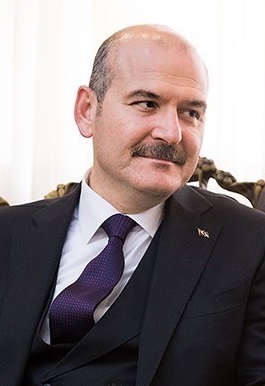‘Take your dirty hands off of Turkey’, Ankara’s Interior Minister Tells US Envoy
Suleyman Soylu hits out at the US ambassador in Ankara after Washington and eight European countries issued travel warnings over possible terror attacks in Turkey

All Global Research articles can be read in 51 languages by activating the Translate Website button below the author’s name (desktop version)
To receive Global Research’s Daily Newsletter (selected articles), click here.
Follow us on Instagram and Twitter and subscribe to our Telegram Channel. Feel free to repost and share widely Global Research articles.
***
Turkey‘s interior minister railed against the US ambassador to Ankara on Friday, telling him to take his “dirty hands off of Turkey”.
Suleyman Soylu, an ardent critic of the United States, whom he blames for the 2016 military coup attempt, has been hitting out at Washington since they issued a travel warning to their citizens of increased risk of attacks in Turkey last week.
The US, along with eight European countries, have either temporarily closed embassies and consulates in Turkey or issued travel warnings after the Quran-burning protests in Europe.
The US consulate in Istanbul, which is located far from the city centre and less vulnerable to attacks, remained open.
Turkish officials say the closures and warnings are an attempt to portray Turkey as an unstable state.
“Every US ambassador who arrives in Turkey is hurrying to find out how to make a coup possible in Turkey,” said Soylu, referring to US Ambassador Jeffry Flake, during an address made at a ministerial event in Antalya on Friday.
“I address the US ambassador from here. I know the journalists you made write articles,” he added.
“Take your dirty hands off of Turkey. I’m being very clear. I very well know how you would like to create strife in Turkey. Take your grinning face off from Turkey.”
Soylu continued by accusing US embassies in Europe of convening together in an attempt to control the continent. He added that US efforts in Turkey were futile thanks to Turkish President Recep Tayyip Erdogan.
Diplomatic tensions
The closure of western diplomatic missions has been met with scorn in Turkey.
In response to the initial security alerts issued on Friday, which warned against “possible retaliatory attacks by terrorists against places of worship,” Turkey responded by issuing similar warnings.
Ankara cautioned its citizen against “possible Islamophobic, xenophobic, and racist attacks” in the United States and Europe.
Turkey later summoned the nine ambassadors, including Flake, for talks over the warnings.
On Thursday, Soylu condemned the closures as an attempt to meddle in campaigning for Turkey’s presidential and parliamentary elections, which are scheduled for 14 May.
He and other officials suggested that the western states had issued the security warnings in order to pressure Turkey to tone down its criticism of the Quran protests and resolve the Nato dispute.
“They are waging psychological war against Turkey,” Soylu told NTV television. “They are trying to destabilise Turkey.”
The Turkish interior ministry earlier this week said authorities had arrested a number of suspects after an allied country passed over a security warning.
“No weapons, ammunition, or signs of action were detected during the searches,” the ministry said. “However, the investigation is carried out meticulously in all aspects, including digital material reviews.”
A total of 15 suspects were detained, Soylu said, but only five of them were kept in custody.
Soylu and Washington have a longstanding animosity. In 2018, the Trump administration temporarily sanctioned Soylu and Justice Minister Abdulhamit Gul over the arrest and detention of Pastor Andrew Brunson, a US citizen.
The following year, the US again sanctioned Soylu and other Turkish officials over Turkey’s offensive against US-backed Kurds in northeastern Syria. “There hasn’t been any change in my declaration of property since the last sanction,” he joked at the time. “I don’t have any properties in the US.”
Both designations were short-term and later lifted.
Since Soylu came into office in 2016, he has gradually suspended intelligence sharing between the US and Turkey. He blamed Washington for the deadly Istanbul bombing in November last year.
*
Note to readers: Please click the share buttons above. Follow us on Instagram and Twitter and subscribe to our Telegram Channel. Feel free to repost and share widely Global Research articles.
Featured image: Süleyman Soylu, Turkish Interior Minister (Licensed under CC BY 4.0)

